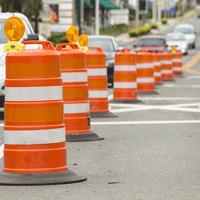Truck Safety in Construction Zones
December 27, 2018 Accidents in work zones occur every day throughout the United States. Over the past five years, over 200,000 injuries and over 4,000 deaths have been attributed to construction zone accidents on highways. Driving in a construction zone can be extremely hazardous for large trucks. According to the Federal Highway Administration (FHA), over 130 fatalities involving large trucks occur in construction zones each year.
Accidents in work zones occur every day throughout the United States. Over the past five years, over 200,000 injuries and over 4,000 deaths have been attributed to construction zone accidents on highways. Driving in a construction zone can be extremely hazardous for large trucks. According to the Federal Highway Administration (FHA), over 130 fatalities involving large trucks occur in construction zones each year.
High Risk Construction Zones
The largest percentage (47 percent) of fatal construction zone accidents involving trucks occur on rural interstates. In almost half of the truck crashes occurring in work zones, the truck driver hits a vehicle or obstacle in front of them. Construction zones located on highways often have narrow and shifting lanes that can prove difficult to navigate for large trucks. The reduced speeds in construction zones also present problems for large trucks as smaller vehicles attempt to merge into traffic lanes.
Increasing Truck Safety
Truckers can take several precautions while driving in construction zones to help prevent collisions. Work zones must post signs indicating changes in normal traffic patterns. Truck drivers should be vigilant for these signs and follow all posted speed limits. By driving at or below the recommended work zone speed limits, truck drivers may be better able to negotiate changing traffic patterns and stop unexpectedly.
Even when all vehicles are driving at reduced speeds in a construction zone, it is important for truck drivers to keep adequate space between their truck and other vehicles. Drivers should remain aware of any upcoming traffic patterns by scanning ahead of them for stopped vehicles or new traffic lanes. Flashers should be used when possible to signal traffic to following vehicles.
Distracted driving is a factor in over 30 percent of work zone fatalities involving large trucks. Drivers need to always pay attention to the road ahead of them while avoiding common driving distractions including talking or texting on cell phones, eating or drinking, frequently changing radio or climate control dials, grooming, or reading maps.
Blind spots can be especially problematic in construction zones. Truck drivers need to take special care while merging in work zones as other vehicles may speed up and cut off trucks while trying to move into an open lane. By merging into the open lane early when a lane change in required, truck drivers can give themselves the adequate time needed to shift lanes safely.
Drivers always should remain alert to the possibility of a construction worker being in the road ahead. When workers or machinery enter a traffic lane, drivers must be cautious and allow the workers to take the right of way. Truckers must watch for signs such as “Flagger Ahead”, which are meant to increase awareness that a worker is on the road.
Highway maintenance is a fact of life for truck drivers. While the improvement of road conditions is a good thing, it often requires patience as reduced speeds and makeshift lanes can increase dangers for all drivers. Making truck safety a priority can reduce the number of serious and fatal truck accidents.
Philadelphia Truck Accident Lawyers at Galfand Berger LLP Fight for Those Injured in a Construction Work Zone
The experienced truck accident lawyers at Galfand Berger LLP help trucking accident victims and their families throughout Pennsylvania and New Jersey, including those in the Philadelphia, Reading, Bethlehem, Allentown and Harrisburg areas. To speak an experienced Philadelphia truck accident lawyer about receiving compensation for your injuries, call us today at 800-222-USWA (8792) to schedule a free consultation or contact us online.
 Google Screened
Google Screened
